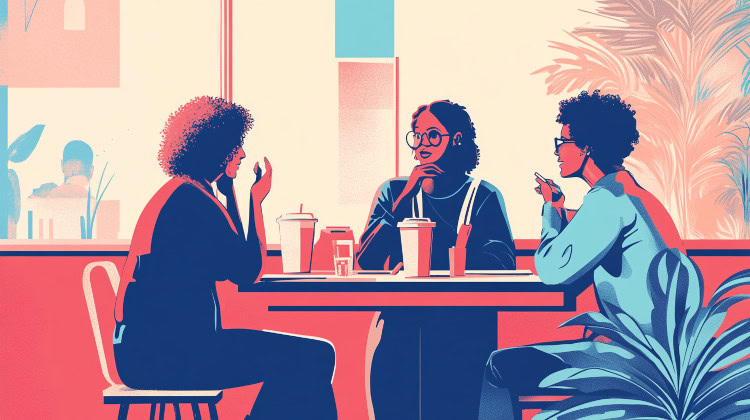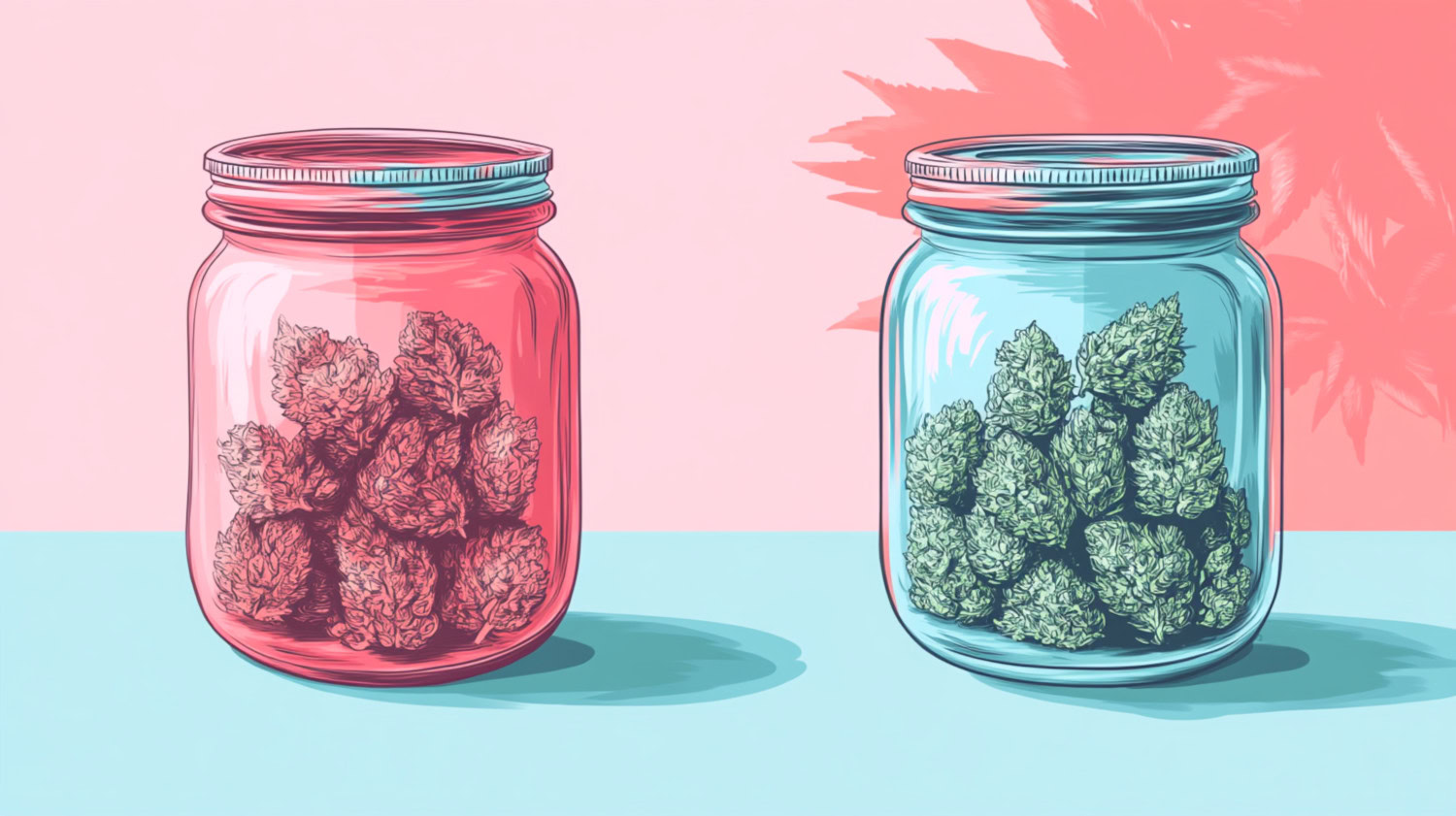In This Article
- Is Cannabis Still Hard to Talk About?
- Misconceptions
- Legal History
- Cultural Differences
- Discussing Cannabis as Medicine
- Clearing Up Myths and Misconceptions
- Myth 1: Medical Cannabis is Just an Excuse to Get High
- Myth 2: Cannabis is a Gateway Drug
- Myth 3: Smoking Cannabis is Harmful
- How to Approach the Conversation Delicately
- Choose the Right Setting
- Lead with Facts, Not Emotion
- Listen to Their Concerns
- What to Do When Friends or Family Don’t Understand
- Set Boundaries
- Give Them Time
- Know When to Step Back
- Self-Care
- References
Key Takeaways
- Present medical cannabis as you would any prescription by focusing on how you track your dosage and treatment goals.
- People’s doubts often come from old stereotypes, so focus on facts and give them time to understand.
- Protect your peace by sharing only what feels right and avoiding unproductive arguments.
Despite growing acceptance, cannabis can still be a taboo topic. If you're using medical cannabis to manage a health condition, discussing it with loved ones might be inevitable for some. However, with the right approach, you can make the conversation go more smoothly.
Is Cannabis Still Hard to Talk About?
Cannabis legalization has expanded across the United States, with most Americans now supporting legal medical and recreational use. Yet, stigma persists, especially among older generations raised on Reefer Madness scare tactics or those influenced by decades of misinformation.
Cannabis may still be a sensitive topic for some due to several reasons.
Misconceptions
The moment you mention medical cannabis, some might picture a hazy dorm room instead of a licensed dispensary providing measured doses. That knee-jerk association, that cannabis is all about getting high, derails real talk before it starts.
Even with lab-tested tinctures in amber bottles, you’re resisting generations of pop culture that have made this medicine a stoner cliché.
Legal History
The War on Drugs framed cannabis as a societal menace, not through science but through policy.1 For decades, possession arrests spiked over minor charges, DARE programs taught kids that cannabis equaled failure, and employers fired workers for failed drug tests. These weren’t neutral laws. They were cultural indoctrination.
Now, with medical cannabis legal in most states, that ingrained fear lingers. Older generations who remember nightly news segments linking cannabis to violence aren’t being stubborn. They’re reacting to what they were systematically taught to believe. Legal changes can’t erase that conditioning overnight.
Cultural Differences
Cannabis attitudes can flip like a switch. Even in countries with progressive cannabis policies, patients often hide their medical use to avoid judgment.2 In some circles, mentioning your medical use might spark a friendly chat about favorite strains. In others, it could mean awkward silences or even judgment.
What’s considered legitimate medicine by one group might still be considered a bad habit by another. For patients, that means constantly reading the room before opening up and never quite knowing how the conversation will land.
Discussing Cannabis as Medicine

Here's the problem: People hear "cannabis" and think "weed." They don't picture a doctor reviewing your medical history or a batch number on your medicine that lets you look up lab results.
So flip the script. Talk about it like you would any other treatment. The words you use change everything.
- Start by replacing recreational terms with medical ones. Instead of sharing how a strain makes you feel, explain how a 10mg CBD capsule fits into your treatment schedule.
- Track your doses alongside other medications in your health app. This simple act reinforces its legitimacy.
- If working with a medical cannabis doctor, mention that they monitor your THC intake like any other prescription.
- Refer to products by their lab-tested percentages rather than catchy names. A 1:1 THC:CBD tincture sounds clinical, while "that nighttime blend" doesn’t.
Clearing Up Myths and Misconceptions

Myth 1: Medical Cannabis is Just an Excuse to Get High
Many medical cannabis products are formulated differently than recreational weed, with higher CBD, lower THC, or isolated compounds like CBG. However, some patients do use THC-dominant flower or edibles for conditions like chronic pain or nausea. Medical use is dose-controlled and symptom-targeted, not about chasing a high.3
Myth 2: Cannabis is a Gateway Drug
The idea that cannabis use inevitably leads to harder drug use has been widely challenged by research. Most patients who use medical cannabis do not go on to use illicit drugs. In fact, many use cannabis to reduce reliance on more addictive pharmaceuticals like opioids.4
Myth 3: Smoking Cannabis is Harmful
While smoking any plant material carries risks, medical cannabis offers safer alternatives. Transdermal patches deliver precise THC doses that may help with pain without lung risks, while sublingual tinctures allow exact milligram dosing. Even vaporizers, when used medically, heat cannabis at lower temperatures to reduce toxins compared to smoking.
How to Approach the Conversation Delicately

Timing and tone matter. Here’s how to keep the discussion constructive:
Choose the Right Setting
Timing and framing matter more than facts. Choose a private, low-stakes moment, like during a casual coffee chat, not at Thanksgiving dinner or during a medical emergency.
Look for organic openings, like: “You know how I’ve struggled with migraines? My doctor suggested trying a CBD tincture.”
Lead with Facts, Not Emotion
When someone gives you that sideways glance about medical cannabis, don't get dragged into an argument. Stick to what can't be argued with.
Your doctor signed off on this. The bottle has a lab-tested THC percentage printed right on it. The dispensary checked your ID and medical card like a pharmacy. These are facts, not opinions.
Listen to Their Concerns
When someone questions your medical cannabis use, hear them out first.
Most skeptics aren't trying to be jerks. They're usually scared you’ll get addicted, worried about side effects, or just repeating what they heard on the news.
Validate their feelings before responding. Try this:
“I get why you’d think that. I had the same concerns until I saw how strictly this is regulated.”
What to Do When Friends or Family Don’t Understand

Even after a thoughtful conversation, some people might still resist or judge your choice. That’s okay. You can’t control their reactions, but you can control how you respond.
Set Boundaries
If someone digs in their heels after you’ve shared your truth, try something like: "I know this might feel surprising, but this treatment is really helping me. I’d love your support, but I also respect that we might see things differently." This leaves room for them to come around on their own time.
Give Them Time
Not everyone will get it right away, and that’s okay. Real change happens gradually, not in a single conversation. Instead of pushing, let small moments do the work. Your results, better sleep, less pain, and ability to show up for life again will speak louder than arguments.
Know When to Step Back
You’ve explained. You’ve shared research. You’ve shown your progress. If they still don’t accept it? That’s their limit, not yours.
A simple, “I’ll have to trust my doctor on this one,” ends the debate with dignity. Then redirect to your recovery, to their life, to anything else.
Not every relationship needs this understanding to survive. Protect your peace first.
Self-Care
These discussions can leave you emotionally drained long after they end. That lingering tension in your shoulders or the mental replay of unspoken comebacks are physical reactions that tell the real story.
Try this:
- Anchor yourself: Note one concrete way cannabis improved your day. (Example: “attended my daughter's recital without pain.”)
- Physically reset: Step outside for fresh air, sip tea slowly, or stretch gently.
- Reconnect with support: Contact someone who understands what you’re going through. Connect with your support system.
References
- Dahlke S, Butler JI, Hunter KF, et al. The Effects of Stigma: Older Persons and Medicinal Cannabis. Qualitative Health Research. 2024;34(8-9):717-731. doi:10.1177/10497323241227419 ↩︎
- Hulaihel, A., Gliksberg, O., Feingold, D., Brill, S., Amit, B. H., Lev-ran, S., & Sznitman, S. R. (2023). Medical cannabis and stigma: A qualitative study with patients living with chronic pain. Journal of Clinical Nursing, 32, 1103–1114. https://doi.org/10.1111/jocn.16340 ↩︎
- Bottorff, J.L., Bissell, L.J., Balneaves, L.G. et al. Perceptions of cannabis as a stigmatized medicine: a qualitative descriptive study. Harm Reduct J 10, 2 (2013). https://doi.org/10.1186/1477-7517-10-2 ↩︎
- Garcia-Romeu A, Elmore J, Mayhugh RE, Schlienz NJ, Martin EL, Strickland JC, Bonn-Miller M, Jackson H and Vandrey R (2022) Online survey of medicinal cannabis users: Qualitative analysis of patient-level data. Front. Pharmacol. 13:965535. doi: 10.3389/fphar.2022.965535 ↩︎
The information in this article and any included images or charts are for educational purposes only. This information is neither a substitute for, nor does it replace, professional legal advice or medical advice, diagnosis, or treatment. If you have any concerns or questions about laws, regulations, or your health, you should always consult with an attorney, physician or other licensed professional.




